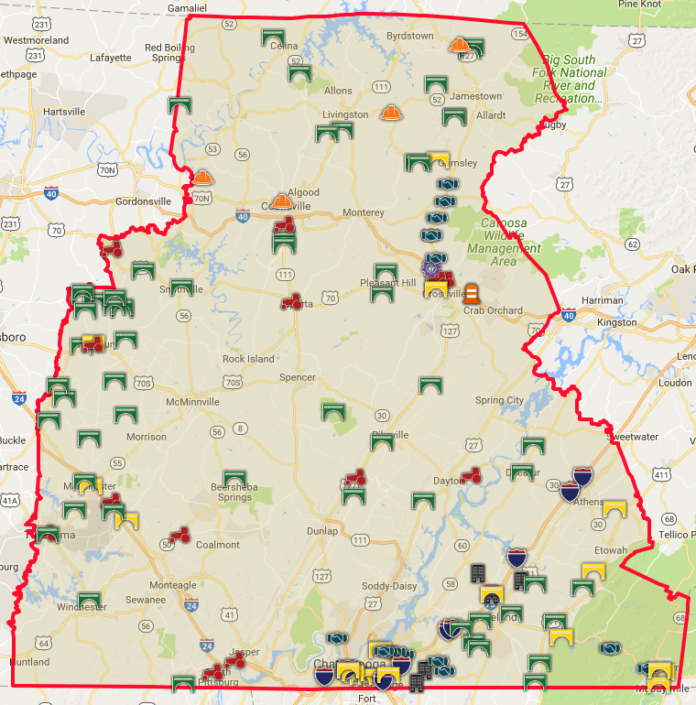By Amye Anderson
UCBJ Managing Editor
UPPER CUMBERLAND – Gov. Bill Haslam, along with Tennessee Department of Transportation (TDOT) Commissioner John Schroer, recently announced $297 million in contracts for various road and bridge construction projects across the state as part of the first major awarding of IMPROVE Act projects. It’s also the largest such bidding process in TDOT’s history.
“Providing a safe, reliable and debt-free transportation network was our main goal in passing the IMPROVE Act and we are now delivering dozens of much needed road and bridge projects across the state – all while cutting the grocery tax and attracting manufacturing jobs to Tennessee,” Haslam said in a statement. “These investments in Tennessee’s infrastructure will ensure the next generation of Tennesseans will have a robust transportation system.”
In the coming weeks, construction will begin on 72 new projects across the state thanks to increased transportation funds provided through the IMPROVE Act and TDOT’s federal budget. Within the first year of the IMPROVE Act’s implementation, one-third, or 288, of the 962 designated projects are underway.
“While the projects included in the December 2017 letting do not include major projects for the Cumberland Plateau area, the projects that are included in the letting are important,” Jennifer Flynn, TDOT Region 2 Community Relations Officer, told the UCBJ.
A planned $2 million project to resurface more than six miles of I-40 in Cumberland and Putnam counties would improve the lifespan of pavement on I-40 while continuing to move commerce and drive business in Tennessee, Flynn says. Another planned project, the construction of a $339,000 acceleration lane on U.S. 127 at SR-154 in Fentress County and miscellaneous safety improvements along the corridor from the Jamestown city limit to the Pickett County line, would increase driver safety in that area, she added.
More than 50 IMPROVE Act projects have been identified in the Upper Cumberland region – ranging from repairs to state and local bridges, to resurfacing and rural access projects, and safety improvements.
“The projects that are on the IMPROVE Act list are developed because they fall into one or more of the categories of safety, mobility and/or economic development,” said Flynn. “It is important for the continued successful growth of Tennessee that these IMPROVE Act projects go forward through the development process to a successful completion.”
Many of the UC projects listed will remain in the early planning and preliminary engineering stages for the 2018 fiscal year.
“Taking a project from development to construction is a very complicated process, and it involves several phases,” said Flynn. “When we develop projects, there are several stages that each one goes through before it gets to the construction phase, including planning, environmental, design and right-of-way acquisition. Each phase is funded separately, so there could be funding for a phase of a project, but the project itself won’t be under construction this year. Some projects, like spot improvements, don’t take as long to develop, and complicated roadway construction projects may take longer.”
The combined, estimated costs of the identified projects located in the UC, per county, are as follows:
• Cannon County – $18.9 million for improvements to 14 state and local bridges and one rural access road project
• Clay County – $1.1 million for improvements to two local bridges
• Cumberland County – $115.8 million for improvements to nine state and local bridges, the Northwest Connector, renovations to the county’s rest area, and improvements to U.S. 127
• Cumberland County/Fentress County – $46.6 million to convert a three-mile portion of Highway 127 from a two- to a four-lane roadway
• Cumberland County/Putnam County – $2.8 million for an ITS expansion at Rockwood Mountain
• Fentress County – $25.8 million for improvements to eight state and local bridges and U.S. 127
• Fentress County/Pickett County – $10 million for spot safety improvements to a 19-mile stretch of Highway 127 to SR-111
• Jackson County – $376,000 for improvements to one local bridge
• Jackson County/Putnam County – $10 million for spot safety improvements to an 8.67-mile stretch of SR-96
• Overton County – $5.6 million for local bridges and one safety-related project along SR-52
• Putnam County – $55.8 million for safety and rural access projects along N. Willow Ave. and S. Jefferson Ave.
• Van Buren County – $1 million for improvements to one local bridge
• Warren County – $617,000 for improvements to one local bridge
• White County – $10.9 million for improvements to two local bridges and one rural access road
According to Flynn, at least two of the UC projects – the Cumberland-Putnam ITS expansion and the Fentress-Pickett US-127 spot improvements – were named in the three-year State Transportation Improvement Program (STIP) and are slated to receive funding for preliminary engineering in the 2018 fiscal year. State and local bridges located in the counties of Cannon, Cumberland, Fentress, Jackson and Overton are also up to receive “some type of funding” in the 2018 fiscal year as well.
TDOT estimates project bids to increase by about $100 million later this year, with calendar year bids totaling more than $1 billion.
“From planning, to environmental, to design and construction, TDOT’s staff is working diligently to move these important projects forward,” Schroer said. “We are extremely focused on meeting the expectations of our customers by getting projects out the door and completed on time.”
The IMPROVE Act, which stands for Improving Manufacturing, Public Roads and Opportunities for a Vibrant Economy, was signed by Gov. Haslam in 2017. An interactive road and bridge construction project map, complete with project highlights, is available for all projects included in the IMPROVE Act.
Identified projects are being delivered as part of the IMPROVE Act by steadily increasing the gas tax by six cents and diesel tax by 10 cents over the next three years. That act also increases the user fee for electric vehicle owners and, through referendum, allows voters in the state’s largest counties and its four largest cities to impose a surcharge on taxes they already collect to be dedicated to transit projects, according to Haslam’s office.









